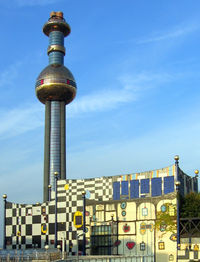
Photo from wikipedia
Mechanical Biological Treatment (MBT; called "dirty" Materials Recovery Facilities in the U.S.) is a waste management method, developed mostly in Europe, which combines sorting of recyclable materials (metals, paper, plastics,… Click to show full abstract
Mechanical Biological Treatment (MBT; called "dirty" Materials Recovery Facilities in the U.S.) is a waste management method, developed mostly in Europe, which combines sorting of recyclable materials (metals, paper, plastics, glass) with composting/digestion of green/ food wastes and, in some cases production of a fuel material. In 2018-19, the authors visited six MBT facilities in Europe that use different approaches for the recovery of materials and energy from mixed MSW. These plants were studied with respect to feedstock composition, operating conditions, capital expenditure, financial viability and environmental impacts. The compost product of most facilities examined did not comply with agricultural standards and, therefore, it was classified as compost-like output (CLO) and used as daily cover in landfills. The best composting practice used source separated organic materials (yard and other green wastes) and yielded a marketable compost. MBT plants that did not include the recovery of fuel materials had lower landfill diversion rates and, also, lower capital and operating costs. It was concluded that an MBT plant must include a very efficient sorting and recyclables recovery line and charge a sufficient gate fee. Also, in addition to the recycled products, there should be a stream to recover fuel materials sent to a power plant or cement plant, thus increasing revenue, and landfill diversion, and maximizing greenhouse gas (GHG) savings.
Journal Title: Waste management
Year Published: 2022
Link to full text (if available)
Share on Social Media: Sign Up to like & get
recommendations!